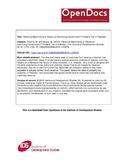Revenue-Maximising or Revenue-Sacrificing Government? Property Tax in Pakistan
| dc.contributor.author | Piracha, Mujtaba | |
| dc.contributor.author | Moore, Mick | |
| dc.coverage.spatial | Pakistan | en |
| dc.date.accessioned | 2018-08-16T11:35:17Z | |
| dc.date.available | 2018-08-16T11:35:17Z | |
| dc.date.issued | 2016-05-12 | |
| dc.identifier.citation | Piracha, M. and Moore, M. (2016) Revenue-Maximising or Revenue-Sacrificing Government? Property Tax in Pakistan, The Journal of Development Studies, 52:12, 1776-1790 | en |
| dc.identifier.uri | https://opendocs.ids.ac.uk/opendocs/handle/20.500.12413/14000 | |
| dc.description.abstract | The idea that states seek to maximise their revenue collection has occupied a significant place in contemporary political economy analysis of taxation, and has helped us understand the history of state formation. It is, however, very much at variance with the daily experience of tax policy and practice. Governments are frequently revenue-sacrificers: they fail to use the functioning, legitimate tax collection systems they have available to actually collect much revenue. This paper details the case of property tax collection in Pakistan, and concludes that governments tend to maximise rule before they maximise revenue. | en |
| dc.language.iso | en | en |
| dc.publisher | Routledge | en |
| dc.rights | © 2016 Institute of Development Studies UK. Published by Informa UK Limited, trading as Taylor & Francis Group. This is an Open Access article distributed under the terms of the Creative Commons Attribution-NonCommercial-NoDerivatives license (http://creativecommons.org/licenses/by-nc-nd/4.0/), which permits non-commercial re-use, distribution, and reproduction in any medium, provided the original work is properly cited, and is not altered, transformed, or built upon in any way. | en |
| dc.rights.uri | http://creativecommons.org/licenses/by-nc-nd/4.0/ | en |
| dc.title | Revenue-Maximising or Revenue-Sacrificing Government? Property Tax in Pakistan | en |
| dc.type | Article | en |
| dc.rights.holder | © 2016 Institute of Development Studies | en |
| dc.identifier.externaluri | https://www.tandfonline.com/action/showCopyRight?scroll=top&doi=10.1080%2F00220388.2016.1153076 | en |
| dc.identifier.doi | 10.1080/00220388.2016.1153076 | |
| rioxxterms.funder | Default funder | en |
| rioxxterms.identifier.project | Default project | en |
| rioxxterms.version | NA | en |
| rioxxterms.versionofrecord | https://doi.org/10.1080/00220388.2016.1153076 | en |
| rioxxterms.funder.project | 9ce4e4dc-26e9-4d78-96e9-15e4dcac0642 | en |
Files in this item
This item appears in the following Collection(s)
Except where otherwise noted, this item's license is described as © 2016 Institute of Development Studies UK. Published by Informa UK Limited, trading as Taylor & Francis Group. This is an Open Access article distributed under the terms of the Creative Commons Attribution-NonCommercial-NoDerivatives license (http://creativecommons.org/licenses/by-nc-nd/4.0/), which permits non-commercial re-use, distribution, and reproduction in any medium, provided the original work is properly cited, and is not altered, transformed, or built upon in any way.


